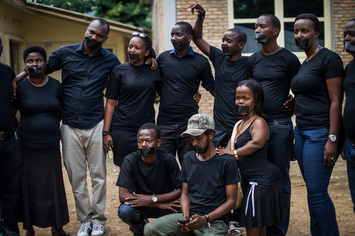 Women's Day, Water Day, Humanitarian Day, Peace Day... Internationally adopted commemorative days are usually celebrated but not World Press Freedom Day in the countries where press freedom is most at risk. On this day last year, three dozen journalists dressed in black met at the offices of ones of the few independent newspapers in the Burundian capital, Bujumbura, to do what journalists on World Press Freedom Day do best: namely, to write about themselves. Their need was greater than most: the near-complete obliteration of the media in Burundi was underway. The government had already closed down the country’s most popular radio station, RPA. They had also cut off the regional broadcasts of the other independent radio stations. Electricity being scarce and illiteracy widespread in Burundi, radio is the primary means of information dissemination. This clamp-down on press freedom had plunged millions into deafness. 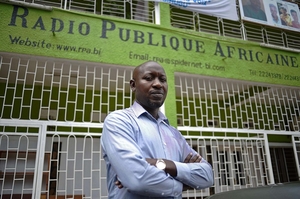 Bob Rugurika, the director of RPA, had spent January in jail for broadcasting reports that implicated the state in the high-profile murder of three Italian nuns. Nevertheless, he found reason to be optimistic when I interviewed him on 3 May 2015: "It’s been a long, step-by-step journey to unite the country, but after 15 years, we suddenly realised that we’d done it. […] Tutsis and Hutus are fighting together against the third term of the president,” he said. The election was looming, and the president wanted a third term in office, in contravention of the constitution and the terms of the peace deal that ended the 13-year civil war. In the weeks that followed Press Freedom Day, things quickly went from bad to worse. A failed coup on May 13th resulted in the government punishing the independent radio stations for broadcasting it. Journalists became traitors. A rocket smashed into RPA. Grenades and gunfire hit Bonesha FM and Renaissance TV. Friends of mine today are still missing valuable evidence because bullets destroyed their hard drives or screens and they can't rescue the data. On 19 May, six days after the coup, a well-known RPA journalist called Euloge Niyonzima left the country in the backseat of my car. He was shaken. Armed men –– state-sponsored assassins, he believed –– had forced entry into his house while his wife and two young daughters slept. (Niyonzima had not been there at the time, knowing already that it was unsafe to sleep in his own home.) Sick at the thought that he was endangering his young family, he left the country by the first available means. He arrived in Tanzania speechless and shaking. He had been so focused on getting out of the country alive that he had not thought about what he would do when he got there. His story, which I wrote for Al Jazeera America in May last year, has not grown old. It continues to be the story of many in Burundi today, who flee in the face of a very real threat to their lives. Six months later, state security forces executed Christophe Nkezabahizi, a respected journalist in his sixties, his wife and two teenage children, by shooting them all at close range in the head and chest. The assassination horrified his colleagues, but did not stop them from their quest to shine light on what was happening in their country. 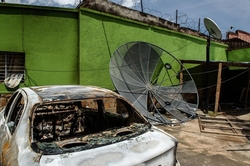 For Burundians, Facebook and WhatsApp have become macabre death blogs, in which the latest killings –– eviscerations, beheadings, executions –– appear in all their gory detail. Mobile phone pictures of death as it really is; not the stylised, sanitised death we see in the western media. And the killing of journalists goes on. Just last week, my Facebook feed told me of a bright, funny, beautiful young intern at Radio Isanganiro, Bélinda, who was punched with bullets and shredded by shrapnel from a grenade while relaxing over a beer in a small bar in Bujumbura one evening. What I mention here is just a tiny proportion of the attacks against Burundian journalists in the last year. But it does not stop them. Those journalists who can, keep on working. (And it is of course very different for the local reporters than it is for us – when it gets tough for us foreigners, we can call our embassies, pack our bags and leave.) So, to those journalists working and living in Burundi today, to those who believe in the power of the press to bear witness, or to those who simply can’t abide by lies, today is your day – chapeau. Photos thanks to Phil Moore, Thomas Mukoya / Reuters, Carl de Souza/AFP, Jennifer Huxta/AFP
0 Comments
No one has been in Goma's Munzenze prison terribly long because when rebels took over the city in November its one thousand inmates all escaped. The rebels arrived and started shooting, the guards ran away. Today, people dressed in bright colours sit with their backs against the prison's tall grey wall holding bundles of deliveries for inmates. Inside, it's a warren of windowless inter-connected rooms, wire-mesh enclosures and dormitories. There's laundry flapping all over the place, people flogging snacks and basic household wares, groups of war veterans sitting in sedate groups, agitated young men picking fights. My guide, a young inmate who enjoys a prefect-like status (presumably due to his good behaviour) courteously gestures for a guard to open the gate for me to enter one of the pens. I notice as he does so there's a man-sized hole in the wire fence left of the gate, which provides an efficient alternative entry point, but -- keeping up appearances -- we use the gate. Standing in the middle of the pen is Alphonse. He's wearing normal clothes - a t-shirt, black slacks - but he has a full-skirted wedding dress over the top. Alphonso, or The Colonel, as he introduces himself, is mad. He speaks excellent English with a proper accent but isn't sure where he learned it. He was a police colonel, he says. Today, he is spear-heading a political movement. This little man with his shoulders crunched up because the bodice of his wedding dress is a bit too tight drags me across the chaotic enclosure to show me a black bomber jacket. He has written on the back in white paint, "M29".
To many people M23 is a motorway but to anyone with a passing interest in Eastern Congo it's the latest headlining rebel group. M29 is Alphonso's version, but he seems unaware of the parody. "We are the movement for defending the rights of minorities", Alphonso says, holding up the bomber jacket to display the logo proudly. This elderly man is the tragic embodiment of 20 years of intermittent conflict in Eastern Congo. 50% of adults here meet criteria for post-traumatic stress disorder, according to a painstaking population-based 2010 survey of the east. That's more than 3 million adults. The same study found that over a million adults had attempted suicide in the last year. Young men and women whose minds fail to cope with the violence and continual displacement - "les fous" - get bound up like turkeys and kept in a dark room. They arrive at the mental health clinic with their wrists bleeding from the metal fetters they've lived with for months, sometimes years. They are the lucky ones. Others are left behind in villages when rebels arrive, only for the rebels to shoot them dead, or worse. Alphonso's only crime is that he's mad, the tour guide says. But he has no family and lives in a place with almost no capacity to deal with mental illness so he's in prison. He sleeps alongside three other men on a lower bunk-bed. The room is just fifteen paces long but sleeps over a hundred men - fourteen bunks, eight to a bed. Some sleep in shifts. The prison was designed for 150 in total but houses 536 at the moment. Four men are "properly mad" in Goma prison, according to inmates. Aside from over-crowding their main complaint is that everyone is lumped in together, the mentally ill, national army veterans, M23 rebels, Mai Mai militiamen, petty criminals, and some who have never even seen a charge sheet. They eat the same thing, rice and beans, every day. "On va mourir" [we're going to die], one man says.  I'm in Madagascar looking for a man I don't believe exists. 'Remenabila' (meaning red swagger) was first described to me in November as Madagascar's "national past-time", the country's most wanted man, despite the fact that he only came to fame last year after killing a number of military personnel in Madagascar's lawless south. "Actually, he's out of power right now", said Amir, my fixer, when I asked him about the man. Remenabila's shaman had just been arrested, he explained, rendering him bereft of his super-natural powers. Remenabila is immune to bullets, Amir continued; he cannot be shot. Every newspaper shows the same blurry photograph of a little man dressed in jelly shoes, a cowboy hat and a blue rain jacket. Sometimes the photographs are framed in western-style WANTED poster. Remenabila is said to be the boss of a multi-million dollar cattle rustling ring that operates across Madagascar's south. Every day, reports emerge of new deaths, the casualties being either 'dahalo', meaning bandits (the term has become synonymous with cattle rustlers), or civilians. The President says 8,000 cattle were stolen last year, with a value of well over $5 million. As far as I can tell, no one has definitively seen Remenabila - ever. No one knows exactly who he is. And no one knows where he is. In one of the poorest countries in the world, there is a $50,000 reward on this man's head ($10,000 for relevant information), and no one has come forward with anything. Yet he has become so much a part of the national discourse that politicians accuse the opposition of creating him to weaken their regime and, at the end of last year, the sanctioned and penniless Government that can't even pay for its hospitals funded a 3-month $500,000 military operation to catch him. It failed (obviously). But there were some winners. Human Rights Watch carried out an investigation of the human rights abuses committed during the operation, and the UN are now carrying out an investigation into the human rights abuses alleged in the Human Rights Watch report. Needless to say, I became a bit obsessed by all this. But I thought that once I was actually in Madagascar it would make sense. To be honest now I'm here it's getting worse. 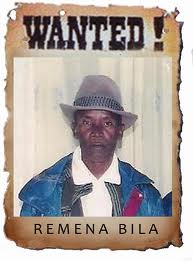 Everyone believes firmly that Remenabila exists, from the most senior local government officials to journalists. This would normally be fine - I don't have a problem with being wrong. Except it's not fine, because every person who believes he exists also believes he has special powers. He's bullet-proof, to be specific. And I'm finding it very hard to bow to the better knowledge of people who believe in a bullet-proof thug in his fifties that no-one has ever seen who roams free (now dressed in a bright red suit, because it protects him) with 10,000 head of cattle despite a $50,000 bounty on his head. Finally, last night, someone spoke some sense. In terms of natural resources, Madagasar is one of the richest countries in the world. For a long time the cattle rustling dahalos have been propped up by corrupt individuals who use them as a smoke screen for the more lucrative smuggling of simpler things (minerals, rosewood, rare species, amongst others) elsewhere on the fabled isle. So the security forces divert their attention to the dahalos, while the illicit trade takes place and no one sees. Given this context, Remenabila would be the ultimate smokescreen. Diverting the entire nation's attention to catching a man who does not exist, or at least not as they believe, is genius. The more they look, the less he is found, and the more attention diverted from elsewhere. 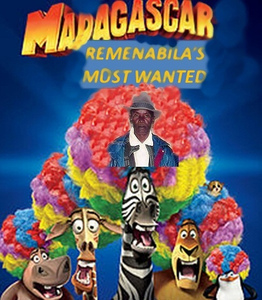 To contextualise, this madness began three years into the rule of an unrecognised and unelected regime whose days in power are numbered. The Government wanted to be seen to have achieved something, people say, hence putting its weight behind the campaign to catch Remenabila. But in addition to that, it's less of a PR disaster to blame a few thousand square kilometres of insecurity on one man with supernatural powers than it is to admit widespread and uncontainable criminality. Look at the history of Western reporting on conflict - we all like a baddy to personify a war. But the Remenabila story is out of control. According to frantic (and often overstated if not invented) media reports, groups of young men turn up in villages every night, threatening and killing innocent people, stealing cows, and being allowed to do so because they're working with Remenabila and they have magic powers. You can't kill them - but they can kill you. These aren't cattle rustlers but arcadian terrorists committing atrocities in the name of a man that doesn't really exist. "He's like the Loch Ness Monster", a source at Amnesty said. I won't give up but so far have zero evidence to support his existence and am struggling to take seriously anyone who seriously believes in Remenabila's superpowers. Prince strikes a blow for the rhino | The Times 03/01/2013 09:38
by Jessica Hatcher in Nairobi and Valentine Low Published at 12:01AM, January 3 2013 With five rhinos killed in a fortnight, it was nothing less than a slaughter. After one of the best protected sanctuaries in Africa saw the bloodiest month of the bloodiest year on record, the Duke of Cambridge has called for urgent action to stop the killing. The deaths came at the Lewa Wildlife Sanctuary in Kenya, where the Duke has been a regular visitor. In the space of two days at the beginning of last month, four black rhinos were found shot dead. Two weeks later, a recently weaned four-year-old calf was discovered dead riddled with bullets. A St James’s Palace spokesman said: “The Duke is concerned that action must be taken now to stem the tide before it is too late and these magnificent creatures become lost to the wild forever.” When Prince William spent part of his gap year at Lewa there had not been a single poaching incident on the reserve. Twelve years later they have lost 11 animals, five in one year. Lewa’s 126 remaining rhinos face the highest threat level in history. “Species conservation is something the Duke feels passionate about,” the spokesman said. “He has been keeping a close eye on the poaching crisis ... and is alarmed by the increase in the numbers being killed.” The illicit trade in rhino horn and elephant ivory is bigger now than ever before. In South Africa an estimated 650 rhinos were killed by poachers in 2012, an astonishing increase on the total number of 13 in 2007. Africa had about 1.6 million elephants 25 years ago. Now, their numbers are estimated at a quarter of that. Poachers are operating in organised crime syndicates. Increasingly evidence points to the illicit horn and ivory trade funding the operations of terror organisations including al- Shabaab in Somalia, and the Lord’s Resistance Army in Central Africa. A voracious consumer appetite, primarily in southeast Asia, means that the financial rewards are higher than ever. Rhino horn fetches up to £25,000 a kilo and a poacher in Kenya can earn more than the average annual salary in one night if successful in acquiring a single horn. Lewa Wildlife Conservancy, formerly a family-owned cattle ranch, spans 62,000 acres of pristine conservation land and is home to more than 10 per cent of Kenya’s black rhino population. “Lewa is now more than ever determined to counter these threats by increasing our security and monitoring efforts,” said Mike Watson, the sanctuary’s chief executive. Lewa’s 150 armed wildlife rangers are trained to British army standards and granted Kenya Police Reservist status, allowed to carry automatic weapons and make arrests. One man has been held after last month’s killings. The Duke, whose visits to Lewa inspired him to become patron of the UK wildlife charity Tusk Trust, has spoken publicly against poachers, most recently in June when he called those involved as “extremely ignorant, selfish and utterly wrong”, and warned of the effects on African tourism. Charlie Mayhew, chief executive of Tusk Trust, said: “There are real alarm bells ringing. It is Kenya’s economic assets that are also being hit, not just the animals.” All eyes are on a key meeting of the international wildlife trade watchdog, Cites, in March, where lobbyists will fight for the international watchdog to close a loophole that allows the domestic trading of ivory. |
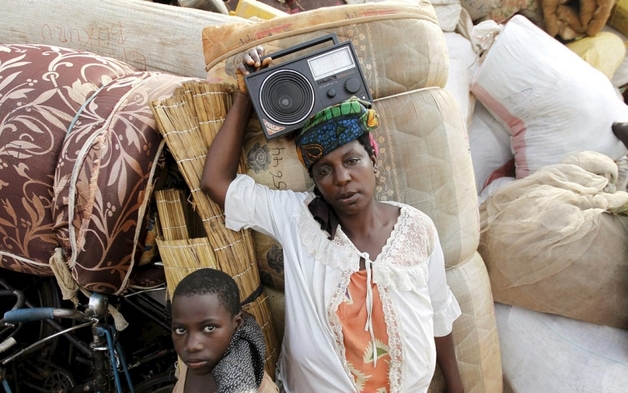
 RSS Feed
RSS Feed
